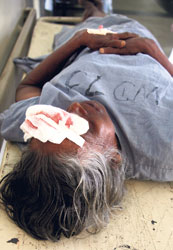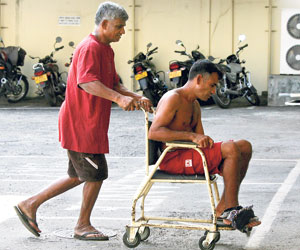All of them come or are brought to the Accident Service of the National Hospital in Colombo bruised and broken. Some are conscious and in pain while many are unconscious, having suffered major trauma, be it an accident or an incident.
 |
| A patient lies on a trolley after receiving medical attention at a busy ward in the Accident Service |
Men, women and children rushed in, with blood all over, sometimes all alone, brought in by a bystander, while kith and kin are unaware that a major mishap has befallen their loved ones.
While the doctors, nurses and minor staff promptly attend to their medical needs, who is there to act as their “friend” when they are most in need, providing a change of clothing from the blood-splattered and torn garments they are wearing; making that crucial call to let relatives know of the fate of their loved one; or just holding their hand to give them moral support.
“Being there”, not only for the patients but also for the staff has been the role of the Friends of the Accident Service since 1985, not only silently helping patients but also seeing when and where they can be of service by providing vital equipment or even biscuits and hot tea and coffee to the staff who sometimes have to work round-the-clock.
An accident can happen to anyone, anywhere, from the man on the street to the VIP, stresses Dr. Prasad Ariyawansa, the Director of the 308-bed Accident and Orthopaedic Service of the NHSL, explaining that around 250 people are treated at the Outpatients Department (OPD) daily while about 110 others are admitted.
“People are transferred from all over the country as this is the referral centre as far as trauma is concerned. We have also treated a large number of internally-displaced people who were sent from Vavuniya, not only feeding them but also counselling them,” he says.
 |
| A busy ward and (below) a man being wheeled in with a foot injury |
 |
Working 24 hours a day all 365 days of the year, the Accident and Orthopaedic Service has treated a staggering 92,748 at the OPD and given in-patient care for 27,965 including 8,746 transferred from other hospitals, last year. Nearly 6,500 major operations have also been performed here last year and 12,570 minor surgeries, the Sunday Times understands.
Amidst the hectic schedule of saving lives, the Friends of the Accident Service have been of invaluable help to make the hospital patient-friendly, says Dr. Ariyawansa. “They have assisted and still are assisting us in our endeavour to make this hospital provide the best medical care and the best facilities.”
Recalling the beginnings, the organisation’s Treasurer Ashroff Hussain said that way back in 1985, a few of them answered a call by then Deputy Medical Superintendent Dr. K.N.K. Wijewardene and Orthopaedic Surgeon Dr. S.A. Ediriweera to help clean up the Accident Service. “It was a small, filthy place near the Coroner’s Court down Ward Place and the operating theatre was old and dilapidated. That’s how it all began.”
In 1989, seeing the needs of the Accident Service, this small group advertised in the newspapers seeking support from professionals and businessmen.
By 1990, the Accident Service had moved to the brand new buildings it is now located in and was under Director Dr. Hector Weerasinghe, from whom the mantle fell on Dr. Anil Jasinghe, to be handed over this year to Dr. Ariyawansa.
“We are an approved charity and have worked untiringly to improve the facilities here. One major donation is a ventilator,” says Mr. Hussain. He remembers vividly the day he saw a man from Kattankudy who had come to Colombo for some work. He had got caught in a bomb blast and his family was unaware that he was at the hospital. “It was such a relief for them when we contacted them and told them we were looking after him.”
“Numerous are the ways in which they have helped us,” adds Matron Swarna Amerasinghe, explaining that whenever patients need something that the hospital cannot provide they turn to the Friends of the Accident Service.
 |
| Dr. Ariyawansa |
 |
| Ashroff Hussain |
![]](../images/Matron-Amerasinghe.jpg) |
| Matron Amerasinghe |
Picking one of many instances, she recalls the plight of a 12-year-old boy who had fallen from a height and severely injured his spine. “The boy needed to undergo immediate surgery to insert screws into his spine to prevent a major disability. The Friends of the Accident Service introduced a company which provided the screws,” she said, adding, “they either get whatever we need for the patients or arrange donors”.
When there was a bomb blast, came a flood of patients – many were the needs. One of the main issues the Friends of the Accident Service had sorted out was the replacement of torn, bloodstained clothes most people came in. “We can’t take them into the theatre like that and they have answered that need and provided blue clothes,” says Matron Amerasinghe, adding that now they have stocks of stitched clothes.
Walking us through some of the main wards, she points to the trolleys parked in the corridors with injured patients on them, explaining that when they have a large number of patients, in the past during bomb blasts, or major accidents, they have to put patients on trolleys. Usually trolleys have no mattresses but thanks to Friends of the Accident Service they do now, to keep the patients comfortable.
Seeing patients with blood-soaked bandages on their heads, in blue clothes, resting on the trolleys comfortably is adequate testimony that the Friends of the Accident Service have silently marked their presence in their lives.
Doing your bit
to save a life
Many are the needs of the Accident and Orthopaedic Service and you could contribute your mite towards saving that life, maybe of a man, woman or child. An accident victim, bleeding heavily who is rushed to hospital may need to be taken in for an operation immediately. That person may need blood. Usually blood is stored in the freezer and cannot be administered immediately.
But every moment is crucial and if the victim doesn’t get blood, he may die. You could help buy a ‘fluid warmer’ which would enable the blood to be sent through it and then administered quickly to the victim.
The needs are many ranging from big to small.......air-mattresses to prevent bed sores, as some of the victims cannot move and have to be turned over by the nurses, more ICU beds (these are special beds with equipment) and even the humble bedsheet to name a few.
Your contribution, however small will go a long way. For more information, please contact: Director Dr. Prasad Ariyawansa on phone: 2692534 or email: upulprasadariyawansa@ yahoo.com.
|
